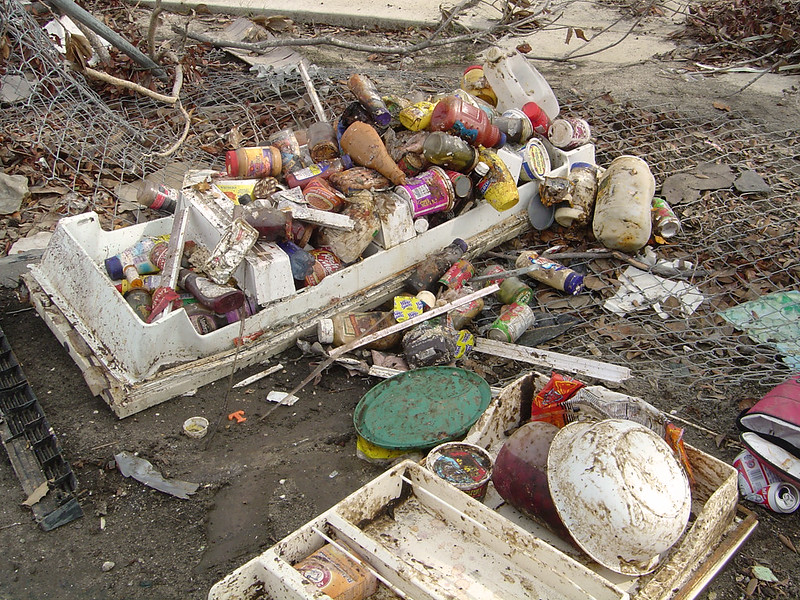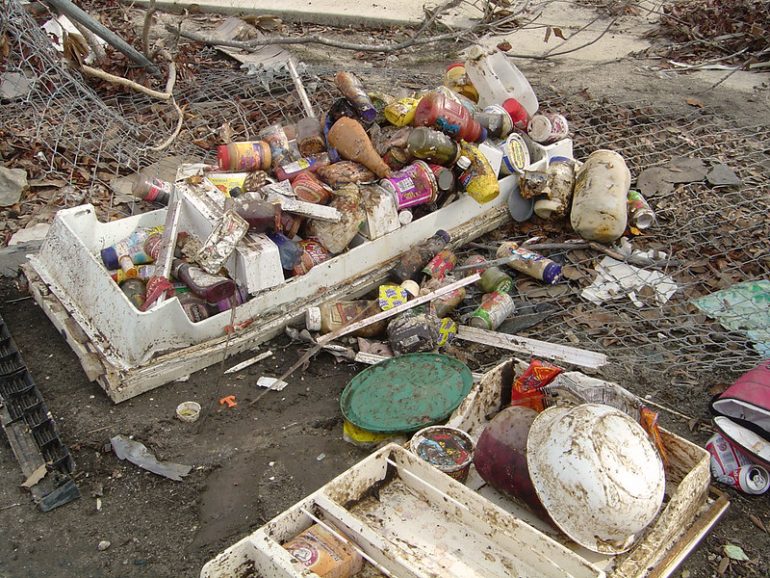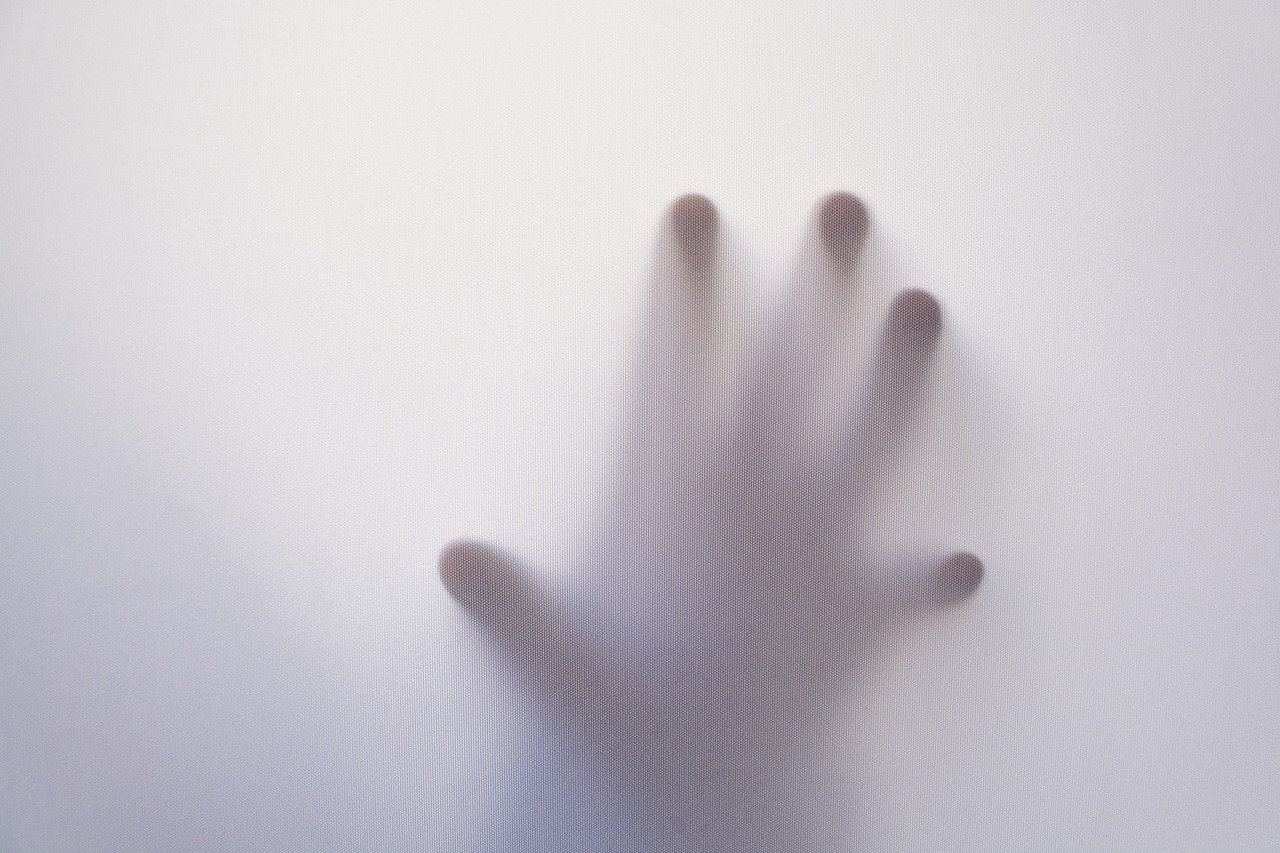Gabrielle Griffis

Elliot pried open an olive-green General Electric fridge. The rubber gaskets made a suctioning sound and popped as the door opened. The contents had been rattled into a Jackson Pollock of decomposing food. The plastic containers, still intact, were covered in films of salad dressing, maple syrup, and hot mustard. A mouldering cabbage had fallen to the bottom of the fridge, its leaves scattered and adhered to the walls. Shriveled apples, flaccid carrots, and cucumbers, blossomed with fuzzy blue-green mold.
Elliot assessed the situation and started picking items from the fridge. He hunched over the metal carcass, dropping cracked bottles and glass shards into a trash bag. It was stuffy inside his suit, the neoprene of his mask smelled, and the combination of his breath and sweat stung his eyes.
When he wasn’t wearing his mask, the noxiousness of the dump swelled in the June heat. Everything felt swollen: the trees, the clouds, the garbage. Salt pooled in his joints, his head. Water made it hard to think, especially on gray days, when the sky was overcast.
Elliot figured he was one of a select few people who cleaned dump refrigerators.
He liked to think that most people cleaned them out before bringing them to the landfill. Nine out of ten refrigerators ended up in some kind of recycling program. Elliot wasn’t certain what happened to the other ten percent, but he was sure it wasn’t good.
Abandoned freezers leached freon into their surrounding environments. Plants shriveled, dead fish floated on the water, raccoons hemorrhaged blood from their orifices. When he first started working at the dump, the department of public works gave him a manual and explained proper safety precautions. They said refrigerants, fluorinated hydrocarbons, were flavorless, odorless gasses that could cause organ damage or “sudden sniffing death” when inhaled.
The town issued him a hazmat suit and told him not to take off the mask while cleaning the fridges. Elliot didn’t know why he would want to take the mask off anyway. He didn’t tell his supervisor, but he knew people who huffed refrigerants. Old housemates that said it made them relax and see colors.
Elliot tried to be grateful for the job. As part of his group-home conditions, he was required to work, and that work came from the town. At first, he was excited at the prospect of working again, of being useful. He had imagined his new job, mulching gardens, planting flowers, organizing mail. When the assignment came, he tried not to be unthankful and smiled at his orders.
As Elliot cleaned, he wondered what kind of situations led people to not empty out their refrigerators—sudden death, careless landlords. He once handled a freezer full of trout, the tin-foiled bodies reduced to a slurry of grey sludge and bones. He couldn’t smell the fish, but knew if he had, it would have haunted him forever. He found soggy pizza boxes, bloated ice cream containers, labels distorted from fluctuating temperatures. Once, he found an old prescription bottle and was tempted to take it home. He decided it wasn’t worth it. He was done with that life, buying pills off the internet, and what’s more, it could have messed with his medications.
Elliot took his bag full of rotting food and walked to the larger garbage heap. The week before, grocery stores had tossed heaps of bagged lettuce, on account of an e.coli recall. Now the bags were full of brown liquid.
* * *
That night Elliot went down to the market to buy a snack. It was eighty degrees and sweltering. The convenience store was cold and dirty, cream linoleum faded into a dingy yellow. He grabbed a pack of sno-balls and a coke. He placed the items on the counter and made himself a slush puppy, squirting the blue raspberry flavoring onto the ice. He sucked as he waited in line, staining his tongue and lips indigo.
As he exited, a group of girls dressed in black stood outside the market. They laughed
among themselves, snapping pink gum over black lipstick. Elliot tried not to stare at their fishnets and bare legs.
“Nice shirt,” one of the girls said, leaning against the wall.
Elliot looked down, having forgotten what he was wearing. His t-shirt said “Jesus Saves”.
“Thanks,” he said, taking a sip of his slush puppy.
“My dad has a t-shirt like that,” the girl with long red hair replied. She fingered her necklace and stared at Elliot. The coke bottle was sweating through the pocket of his cargo shorts. Something inside his chest snapped.
“Where did your dad get his T-shirt from?” He asked, pushing up his wire-rim glasses.
“I don’t know, the Jesus store.” The redhead laughed.
“You want to hang out with us?” One of the girls offered, her white teeth glistening. Her face was like a doll’s. She was pale, thin, and pretty.
“I better not,” Elliot replied. His ears burned. He turned around and walked back towards the group home. There was a pressure between his temples. He sang a praise and worship song to fight his thoughts. He envisioned the internal dimensions of a fridge. There was part of his mind that ran like a cartoon reel on an old TV. Neon figures, distorted body parts. If he wasn’t careful, it would flood his head. He fought the urge to turn around, the night he could have had tormenting his mind.
On the sidewalk, a golden retriever bared its teeth at him. Elliot ascended the steps of the group home and walked inside. He was reminded of what got him there in the first place, the trajectory his life had taken, his job as a dump refrigerator cleaner. He didn’t need to make the paper’s front page again.
Gabrielle Griffis is a multi-media artist, writer, and musician. Her fiction has been published in or is forthcoming from Wigleaf, Okay Donkey, Monkeybicycle, Gone Lawn, XRAY Literary Magazine, decomP,Necessary Fiction, and elsewhere. She works as a librarian on Cape Cod. Learn more at gabriellegriffis.com and follow her on Twitter at @ggriffiss.




